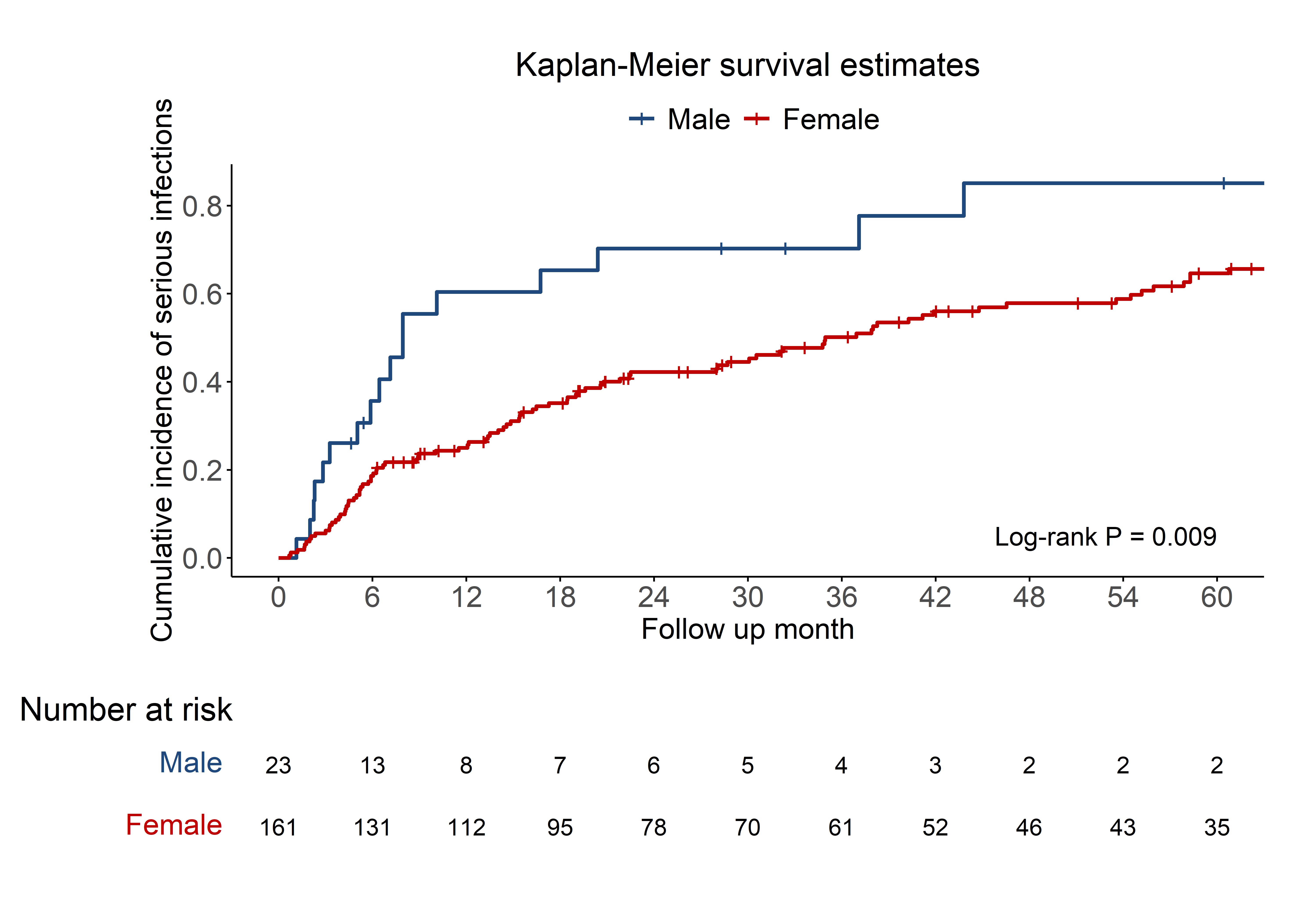Session Information
Date: Monday, October 27, 2025
Title: (1517–1552) Systemic Lupus Erythematosus – Treatment Poster II
Session Type: Poster Session B
Session Time: 10:30AM-12:30PM
Background/Purpose: Lupus nephritis, a key manifestation of systemic lupus erythematosus (SLE), can progress to end-stage kidney disease and increase patient burden. While patients with SLE on maintenance dialysis face high infection-related morbidity and mortality, the risk factors for serious infections in this population remain poorly understood. We aimed to identify risk factors for serious infections and evaluate the incidence and types of infections in patients with SLE undergoing dialysis.
Methods: A retrospective cohort of 184 patients with SLE on dialysis between 2008 and 2023 was analyzed. Serious infections were defined as infections that required hospitalization. Cox proportional hazard models identified risk factors for serious infections, while Kaplan-Meier analyses estimated cumulative risks.
Results: A total of 388 episodes of serious infections occurred in 121 patients and the incidence rate of serious infections was 20.4/100 patient-years (PYs). The median time to the first serious infection was 620 days. Intra-abdominal infections (7.4/100 PYs) and pneumonia (5.4/100 PYs) were the most common infections. Male sex (hazard ratio [HR] 1.72, 95% confidence interval [CI] CI 1.02-2.89) and albumin levels (HR 0.70, 95% CI 0.50-0.98) were independent risk factors for serious infections. Kaplan-Meier analysis confirmed that male sex and lower albumin levels were associated with risk of serious infections (log-rank P = 0.009 and 0.004, respectively). During the follow-up, a total of 18 patients died, with infection being the leading cause of mortality.
Conclusion: Serious infections are common in patients with SLE on maintenance dialysis. Male sex and hypoalbuminemia increase the risk of serious infections. Close monitoring and targeted interventions are crucial to reduce infection-related morbidity and mortality in patients with SLE on dialysis.
 Table 1. Characteristics of patients with SLE at the initiation of dialysis.
Table 1. Characteristics of patients with SLE at the initiation of dialysis.
.jpg) Table 2. Risk factors analysis of the serious infections among patients with SLE on maintenance dialysis.
Table 2. Risk factors analysis of the serious infections among patients with SLE on maintenance dialysis.
.jpg) Figure 1. Kaplan–Meier survival estimates for patients with SLE undergoing dialysis, stratified by sex. SLE, systemic lupus erythematosus
Figure 1. Kaplan–Meier survival estimates for patients with SLE undergoing dialysis, stratified by sex. SLE, systemic lupus erythematosus
To cite this abstract in AMA style:
Kuo P, Fang P, Lai C, Sun Y. Association of Hypoalbuminemia with Serious Infections in Systemic Lupus Erythematosus Patients Receiving Dialysis [abstract]. Arthritis Rheumatol. 2025; 77 (suppl 9). https://acrabstracts.org/abstract/association-of-hypoalbuminemia-with-serious-infections-in-systemic-lupus-erythematosus-patients-receiving-dialysis/. Accessed .« Back to ACR Convergence 2025
ACR Meeting Abstracts - https://acrabstracts.org/abstract/association-of-hypoalbuminemia-with-serious-infections-in-systemic-lupus-erythematosus-patients-receiving-dialysis/
